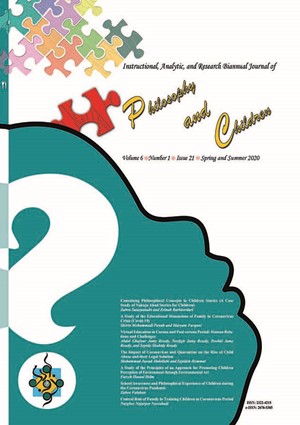Virtual Education in Corona and Post-corona Period: Human Relations and Challenges
Subject Areas : “Philosophy and children” and educationAbdol Ghafour Jamy Roudy 1 * , Towfigh Jamy Roudy 2 , Towhid Jamy Roudy 3
1 -
2 -
3 -
Keywords: ducation e-learning students teachers ,
Abstract :
Correspondence education is one of the methods of education which is followed in certain critical conditions during which students are not able to attend the classes and both teachers and students are asked to form certain virtual groups to hold classes. This method has the following merits: the rise of the self- control of students, restriction of the students to time, the rise of responsibility of students, and the expediting the efficiency and teaching. Apart from the merits of virtual education there are some demerits as well such as: internet addiction of the students, lack of confidence in learning, lack of control over home works by teachers, and inaccessibility of internet facilities in certain times and regions. To improve virtual teaching we have to take the followings steps: television should involve in virtual teaching, valid teaching systems should be used, standard questions should be sorted out, and family internet information should be promoted. The present work aims at detecting problems of virtual teachings and suggesting solutions in Iran particularly in poor regions. The method of this work is based on library and field work. After expressing the demerits and merits of e-learning, provide readers with solutions to increase the quality of e-learning and human relations in the current situations.
ابن فارس بن زکریا، ابوالحسن احمد (1418ق) معجم مقاییس اللغه، بیروت: دارالفکر.
ابن منظور، محمدبن مکرم (1388ق) لسان العرب، بیروت: دارصار، داربیروت.
احمدزاده کرمانی، روح الله (1390) بازاندیشی در فرهنگ و رسانه، تهران: چاپار.
جوهری، اسماعیل بن حماد (1429ق) معجم الصحاح، تحقيق خلیل محمود شیخا، بیروت: دارالمعرفة.
حسینی واسطی زبیدی حنفی، محمدمرتضی (1306ق) تاج العروس من جواهر القاموس، مصر: دارالمکتبة الحیاة.
خوری شرتونی، سعید (1385) اقرب الموارد فی فصح العربیه والشوارد، تهران: بینا.
دهخدا، علی اکبر (1341) لغتنامه دهخدا، تهران: شرکت افست گلشن.
راغب اصفهانی، ابوالقاسم حسین بن احمد (1429ق) المفردات فی الفاظ القرآن، ترجمه جهانگیر ولدبیگی آراس، سنندج: طلیعه نور.
شکرباغانی، اشرف السادات (1399) «آموزش مجازی از نوع روش کلاس درس معکوس، پیآمد شیوع ویروس کرونا و تعطیلی آموزش مدرسهيی»، تهران: پژوهشکده برنامهریزی درسی و نوآوریهای آموزشی پژوهشگاه مطالعات وزارت آموزش و پرورش.
صالحی، وجیهه (1393) «کسب و کار در سیره و معارف امام رضا(ع)»، آرمانشهر رضوی (سیره اخلاقی و عملی امام علی بن موسی الرضا علیه السلام؛ مجموعه مقالات برگزیده همایش علمی ـ پژوهشی اخلاق و آداب رضوی)، زيرنظر علیرضا حاج علی بیگی، اراک: اندیشه مطهر، ص199-164.
طریحی، فخرالدین بن محمد (1403ق) مجمع البحرین، تحقیق احمدالحسینی، بیروت: مؤسسه الوفا.
عسکری، فهیمه؛ فاضلی، سیدمحسن (1394) «تأثیر رسانهها و فضاهای مجازی»، مجموعه مقالات بیست و هفتمین همایش مذاهب اسلامی، زاهدان، ص293ـ279.
فراهیدی، خلیل بن احمد (1425ق) العین، تهران: اسوه.
فیروزآبادی، محمدبن یعقوب (2008م) القاموس المحیط، بیروت: دارالکتاب العربی.
فیومی، احمدبن محمدبن علی (1429ق) المصباح المنیر، قاهره: مؤسسة المختار.
قرشی، سیدعلی اکبر (1375) قاموس قرآن، تهران: دارالکتب الاسلامیه.
کریبر، گلن؛ رویستون، مارتين؛ سرکیسیان، وازگن (1391) فرهنگهای دیجیتال درک رسانههای جدید، تهران: سروش.
کریمپور، عبدالجلیل (1399) «عدم مدیریت بحران و درجازدنی طولانی!»، روزنامه مردم سالاری، سال نوزدهم، شمارة 5368 (پانزدهم مهرماه).

